Organisational Behaviour: Analysing Culture, Power & Motivation at M&S
VerifiedAdded on 2023/06/06
|15
|4530
|172
Report
AI Summary
This report provides an in-depth analysis of organisational behaviour, particularly focusing on Marks and Spencers. It examines how an organisation's culture, politics, and power dynamics influence individual and team behaviour and performance, utilising Charles Handy's model to understand different types of organisational cultures. The report also evaluates content and process theories of motivation, such as Maslow's Hierarchy of Needs and Herzberg's Two-Factor Theory, and how motivational techniques enable effective achievement of goals. Furthermore, it explains the characteristics of effective versus ineffective teams and applies concepts and philosophies of organisational behaviour within the organisational context of Marks and Spencers, highlighting the importance of a conducive working environment for maximizing productivity and fostering positive relationships.
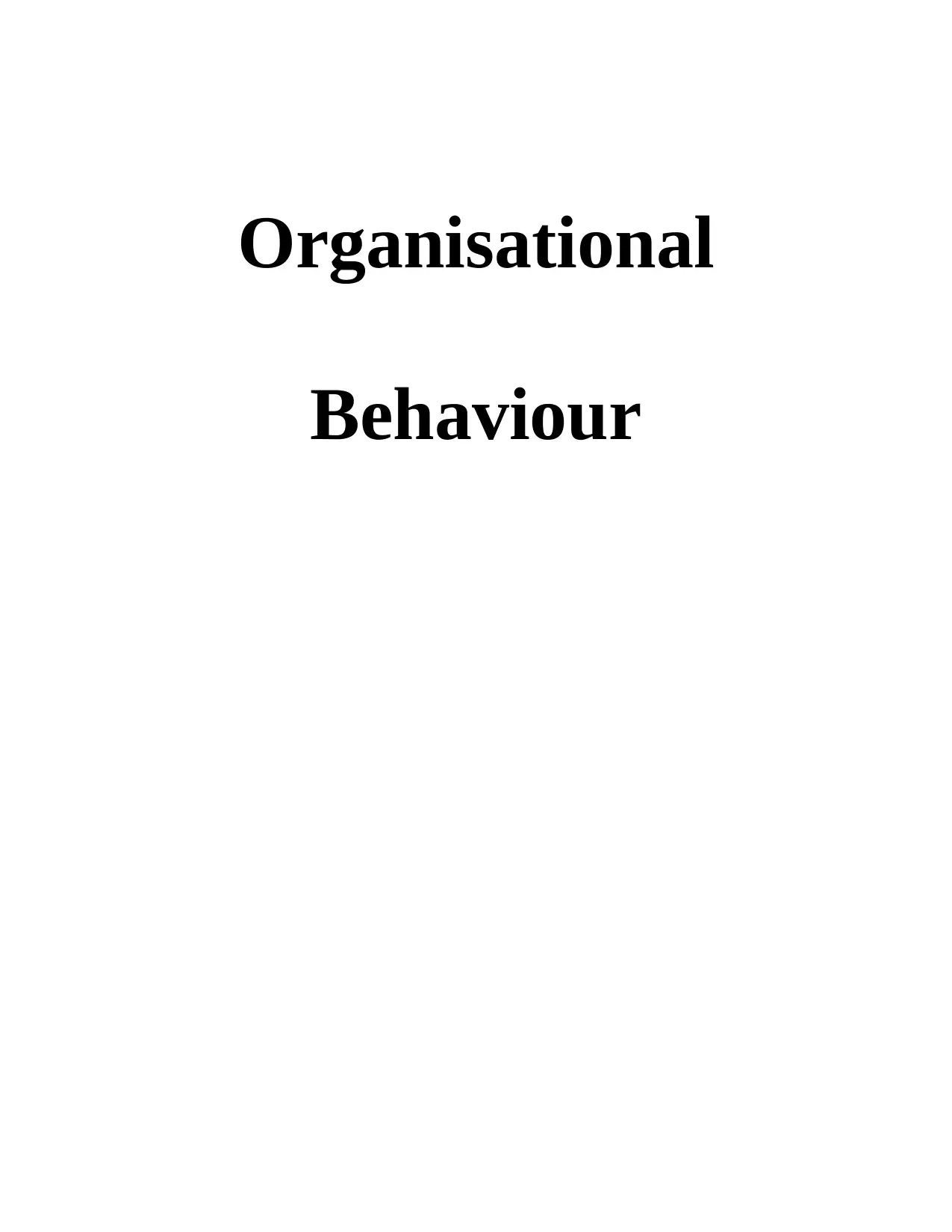
Organisational
Behaviour
Behaviour
Paraphrase This Document
Need a fresh take? Get an instant paraphrase of this document with our AI Paraphraser
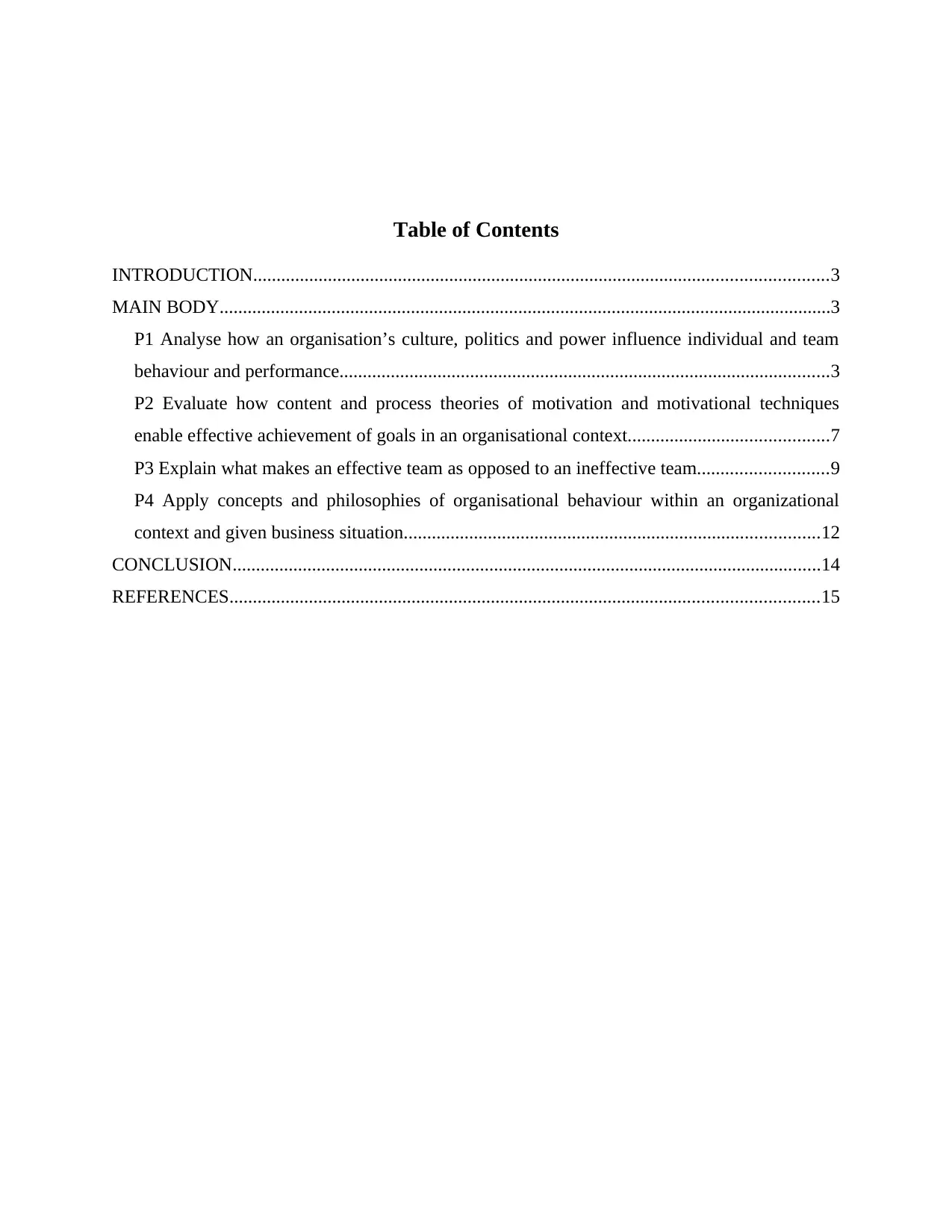
Table of Contents
INTRODUCTION...........................................................................................................................3
MAIN BODY...................................................................................................................................3
P1 Analyse how an organisation’s culture, politics and power influence individual and team
behaviour and performance.........................................................................................................3
P2 Evaluate how content and process theories of motivation and motivational techniques
enable effective achievement of goals in an organisational context...........................................7
P3 Explain what makes an effective team as opposed to an ineffective team............................9
P4 Apply concepts and philosophies of organisational behaviour within an organizational
context and given business situation.........................................................................................12
CONCLUSION..............................................................................................................................14
REFERENCES..............................................................................................................................15
INTRODUCTION...........................................................................................................................3
MAIN BODY...................................................................................................................................3
P1 Analyse how an organisation’s culture, politics and power influence individual and team
behaviour and performance.........................................................................................................3
P2 Evaluate how content and process theories of motivation and motivational techniques
enable effective achievement of goals in an organisational context...........................................7
P3 Explain what makes an effective team as opposed to an ineffective team............................9
P4 Apply concepts and philosophies of organisational behaviour within an organizational
context and given business situation.........................................................................................12
CONCLUSION..............................................................................................................................14
REFERENCES..............................................................................................................................15
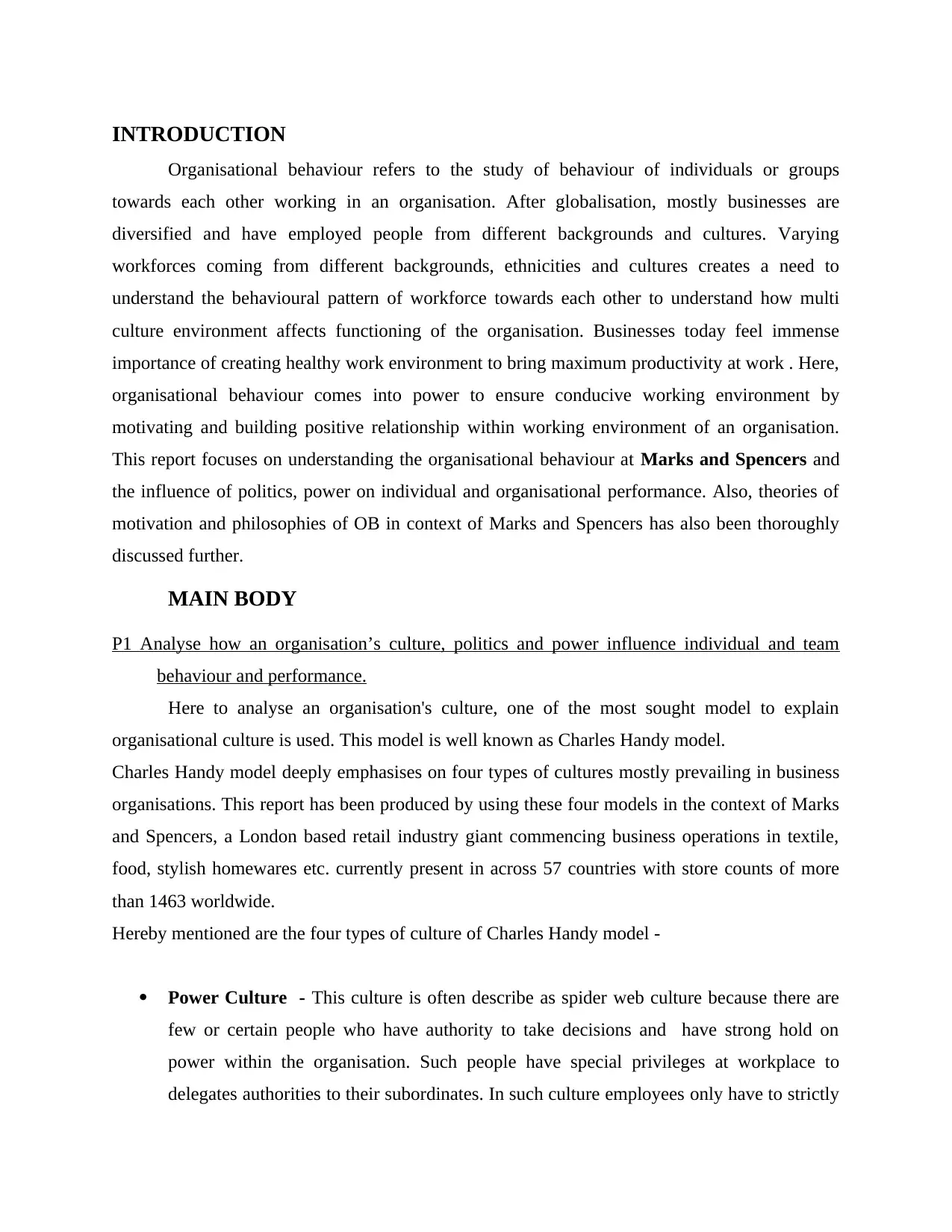
INTRODUCTION
Organisational behaviour refers to the study of behaviour of individuals or groups
towards each other working in an organisation. After globalisation, mostly businesses are
diversified and have employed people from different backgrounds and cultures. Varying
workforces coming from different backgrounds, ethnicities and cultures creates a need to
understand the behavioural pattern of workforce towards each other to understand how multi
culture environment affects functioning of the organisation. Businesses today feel immense
importance of creating healthy work environment to bring maximum productivity at work . Here,
organisational behaviour comes into power to ensure conducive working environment by
motivating and building positive relationship within working environment of an organisation.
This report focuses on understanding the organisational behaviour at Marks and Spencers and
the influence of politics, power on individual and organisational performance. Also, theories of
motivation and philosophies of OB in context of Marks and Spencers has also been thoroughly
discussed further.
MAIN BODY
P1 Analyse how an organisation’s culture, politics and power influence individual and team
behaviour and performance.
Here to analyse an organisation's culture, one of the most sought model to explain
organisational culture is used. This model is well known as Charles Handy model.
Charles Handy model deeply emphasises on four types of cultures mostly prevailing in business
organisations. This report has been produced by using these four models in the context of Marks
and Spencers, a London based retail industry giant commencing business operations in textile,
food, stylish homewares etc. currently present in across 57 countries with store counts of more
than 1463 worldwide.
Hereby mentioned are the four types of culture of Charles Handy model -
Power Culture - This culture is often describe as spider web culture because there are
few or certain people who have authority to take decisions and have strong hold on
power within the organisation. Such people have special privileges at workplace to
delegates authorities to their subordinates. In such culture employees only have to strictly
Organisational behaviour refers to the study of behaviour of individuals or groups
towards each other working in an organisation. After globalisation, mostly businesses are
diversified and have employed people from different backgrounds and cultures. Varying
workforces coming from different backgrounds, ethnicities and cultures creates a need to
understand the behavioural pattern of workforce towards each other to understand how multi
culture environment affects functioning of the organisation. Businesses today feel immense
importance of creating healthy work environment to bring maximum productivity at work . Here,
organisational behaviour comes into power to ensure conducive working environment by
motivating and building positive relationship within working environment of an organisation.
This report focuses on understanding the organisational behaviour at Marks and Spencers and
the influence of politics, power on individual and organisational performance. Also, theories of
motivation and philosophies of OB in context of Marks and Spencers has also been thoroughly
discussed further.
MAIN BODY
P1 Analyse how an organisation’s culture, politics and power influence individual and team
behaviour and performance.
Here to analyse an organisation's culture, one of the most sought model to explain
organisational culture is used. This model is well known as Charles Handy model.
Charles Handy model deeply emphasises on four types of cultures mostly prevailing in business
organisations. This report has been produced by using these four models in the context of Marks
and Spencers, a London based retail industry giant commencing business operations in textile,
food, stylish homewares etc. currently present in across 57 countries with store counts of more
than 1463 worldwide.
Hereby mentioned are the four types of culture of Charles Handy model -
Power Culture - This culture is often describe as spider web culture because there are
few or certain people who have authority to take decisions and have strong hold on
power within the organisation. Such people have special privileges at workplace to
delegates authorities to their subordinates. In such culture employees only have to strictly
⊘ This is a preview!⊘
Do you want full access?
Subscribe today to unlock all pages.

Trusted by 1+ million students worldwide
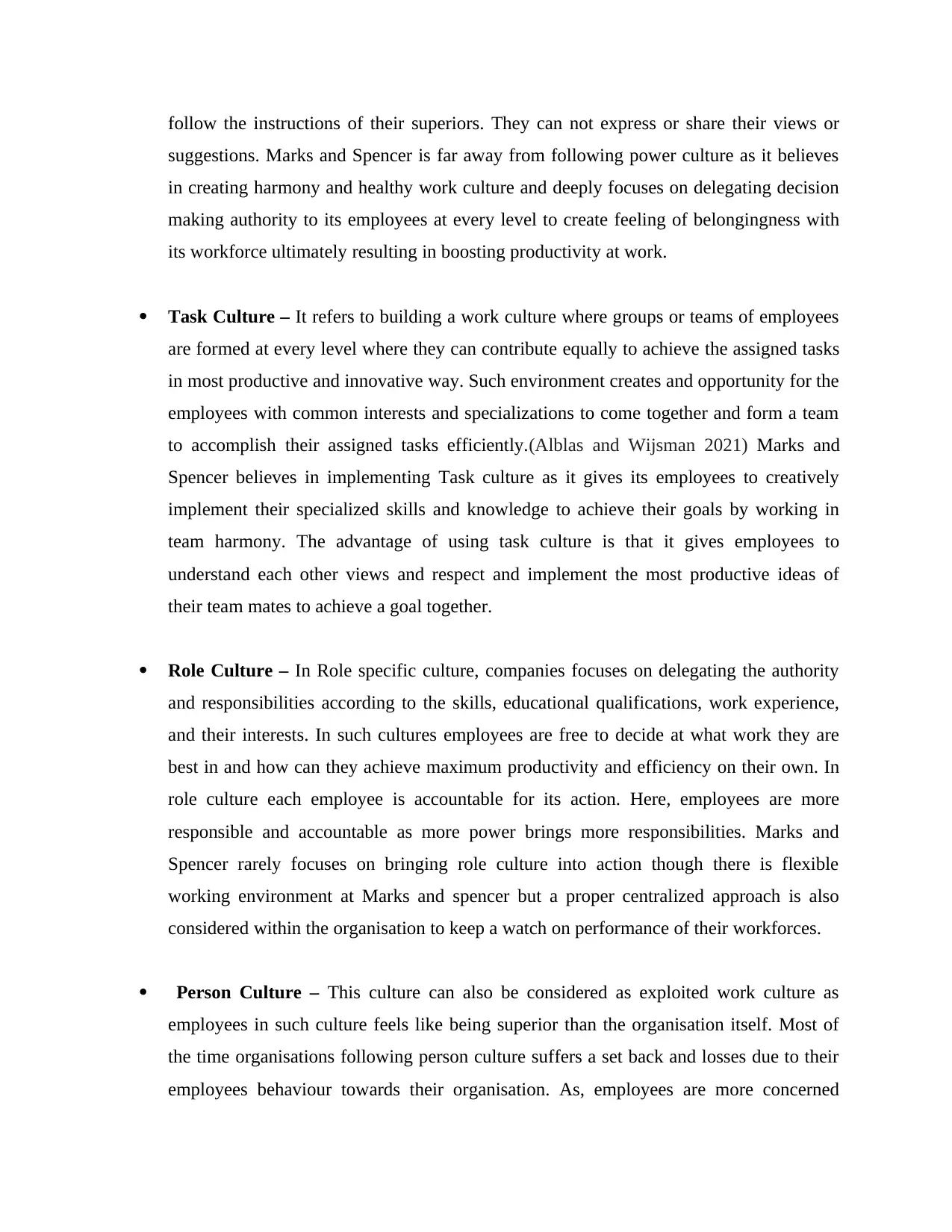
follow the instructions of their superiors. They can not express or share their views or
suggestions. Marks and Spencer is far away from following power culture as it believes
in creating harmony and healthy work culture and deeply focuses on delegating decision
making authority to its employees at every level to create feeling of belongingness with
its workforce ultimately resulting in boosting productivity at work.
Task Culture – It refers to building a work culture where groups or teams of employees
are formed at every level where they can contribute equally to achieve the assigned tasks
in most productive and innovative way. Such environment creates and opportunity for the
employees with common interests and specializations to come together and form a team
to accomplish their assigned tasks efficiently.(Alblas and Wijsman 2021) Marks and
Spencer believes in implementing Task culture as it gives its employees to creatively
implement their specialized skills and knowledge to achieve their goals by working in
team harmony. The advantage of using task culture is that it gives employees to
understand each other views and respect and implement the most productive ideas of
their team mates to achieve a goal together.
Role Culture – In Role specific culture, companies focuses on delegating the authority
and responsibilities according to the skills, educational qualifications, work experience,
and their interests. In such cultures employees are free to decide at what work they are
best in and how can they achieve maximum productivity and efficiency on their own. In
role culture each employee is accountable for its action. Here, employees are more
responsible and accountable as more power brings more responsibilities. Marks and
Spencer rarely focuses on bringing role culture into action though there is flexible
working environment at Marks and spencer but a proper centralized approach is also
considered within the organisation to keep a watch on performance of their workforces.
Person Culture – This culture can also be considered as exploited work culture as
employees in such culture feels like being superior than the organisation itself. Most of
the time organisations following person culture suffers a set back and losses due to their
employees behaviour towards their organisation. As, employees are more concerned
suggestions. Marks and Spencer is far away from following power culture as it believes
in creating harmony and healthy work culture and deeply focuses on delegating decision
making authority to its employees at every level to create feeling of belongingness with
its workforce ultimately resulting in boosting productivity at work.
Task Culture – It refers to building a work culture where groups or teams of employees
are formed at every level where they can contribute equally to achieve the assigned tasks
in most productive and innovative way. Such environment creates and opportunity for the
employees with common interests and specializations to come together and form a team
to accomplish their assigned tasks efficiently.(Alblas and Wijsman 2021) Marks and
Spencer believes in implementing Task culture as it gives its employees to creatively
implement their specialized skills and knowledge to achieve their goals by working in
team harmony. The advantage of using task culture is that it gives employees to
understand each other views and respect and implement the most productive ideas of
their team mates to achieve a goal together.
Role Culture – In Role specific culture, companies focuses on delegating the authority
and responsibilities according to the skills, educational qualifications, work experience,
and their interests. In such cultures employees are free to decide at what work they are
best in and how can they achieve maximum productivity and efficiency on their own. In
role culture each employee is accountable for its action. Here, employees are more
responsible and accountable as more power brings more responsibilities. Marks and
Spencer rarely focuses on bringing role culture into action though there is flexible
working environment at Marks and spencer but a proper centralized approach is also
considered within the organisation to keep a watch on performance of their workforces.
Person Culture – This culture can also be considered as exploited work culture as
employees in such culture feels like being superior than the organisation itself. Most of
the time organisations following person culture suffers a set back and losses due to their
employees behaviour towards their organisation. As, employees are more concerned
Paraphrase This Document
Need a fresh take? Get an instant paraphrase of this document with our AI Paraphraser
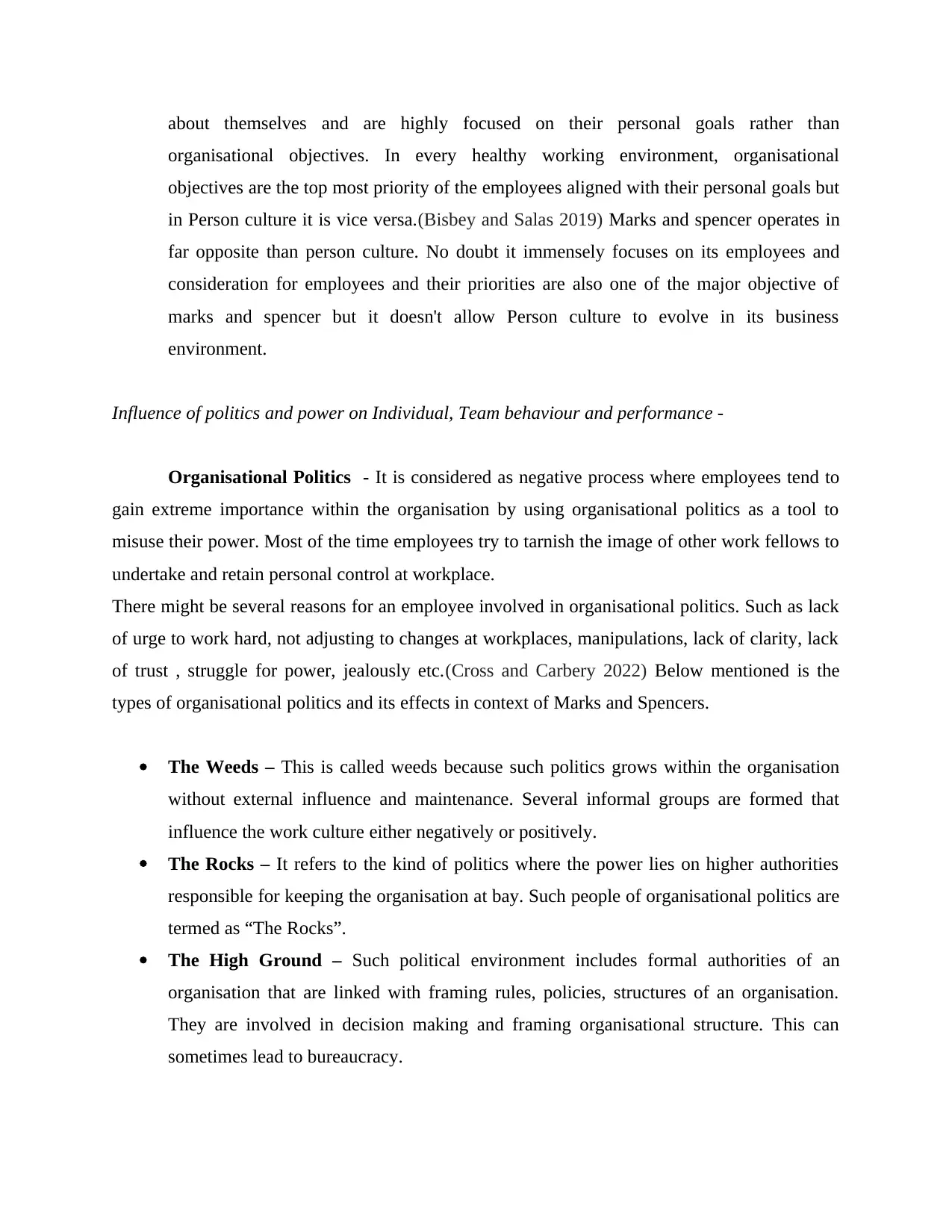
about themselves and are highly focused on their personal goals rather than
organisational objectives. In every healthy working environment, organisational
objectives are the top most priority of the employees aligned with their personal goals but
in Person culture it is vice versa.(Bisbey and Salas 2019) Marks and spencer operates in
far opposite than person culture. No doubt it immensely focuses on its employees and
consideration for employees and their priorities are also one of the major objective of
marks and spencer but it doesn't allow Person culture to evolve in its business
environment.
Influence of politics and power on Individual, Team behaviour and performance -
Organisational Politics - It is considered as negative process where employees tend to
gain extreme importance within the organisation by using organisational politics as a tool to
misuse their power. Most of the time employees try to tarnish the image of other work fellows to
undertake and retain personal control at workplace.
There might be several reasons for an employee involved in organisational politics. Such as lack
of urge to work hard, not adjusting to changes at workplaces, manipulations, lack of clarity, lack
of trust , struggle for power, jealously etc.(Cross and Carbery 2022) Below mentioned is the
types of organisational politics and its effects in context of Marks and Spencers.
The Weeds – This is called weeds because such politics grows within the organisation
without external influence and maintenance. Several informal groups are formed that
influence the work culture either negatively or positively.
The Rocks – It refers to the kind of politics where the power lies on higher authorities
responsible for keeping the organisation at bay. Such people of organisational politics are
termed as “The Rocks”.
The High Ground – Such political environment includes formal authorities of an
organisation that are linked with framing rules, policies, structures of an organisation.
They are involved in decision making and framing organisational structure. This can
sometimes lead to bureaucracy.
organisational objectives. In every healthy working environment, organisational
objectives are the top most priority of the employees aligned with their personal goals but
in Person culture it is vice versa.(Bisbey and Salas 2019) Marks and spencer operates in
far opposite than person culture. No doubt it immensely focuses on its employees and
consideration for employees and their priorities are also one of the major objective of
marks and spencer but it doesn't allow Person culture to evolve in its business
environment.
Influence of politics and power on Individual, Team behaviour and performance -
Organisational Politics - It is considered as negative process where employees tend to
gain extreme importance within the organisation by using organisational politics as a tool to
misuse their power. Most of the time employees try to tarnish the image of other work fellows to
undertake and retain personal control at workplace.
There might be several reasons for an employee involved in organisational politics. Such as lack
of urge to work hard, not adjusting to changes at workplaces, manipulations, lack of clarity, lack
of trust , struggle for power, jealously etc.(Cross and Carbery 2022) Below mentioned is the
types of organisational politics and its effects in context of Marks and Spencers.
The Weeds – This is called weeds because such politics grows within the organisation
without external influence and maintenance. Several informal groups are formed that
influence the work culture either negatively or positively.
The Rocks – It refers to the kind of politics where the power lies on higher authorities
responsible for keeping the organisation at bay. Such people of organisational politics are
termed as “The Rocks”.
The High Ground – Such political environment includes formal authorities of an
organisation that are linked with framing rules, policies, structures of an organisation.
They are involved in decision making and framing organisational structure. This can
sometimes lead to bureaucracy.
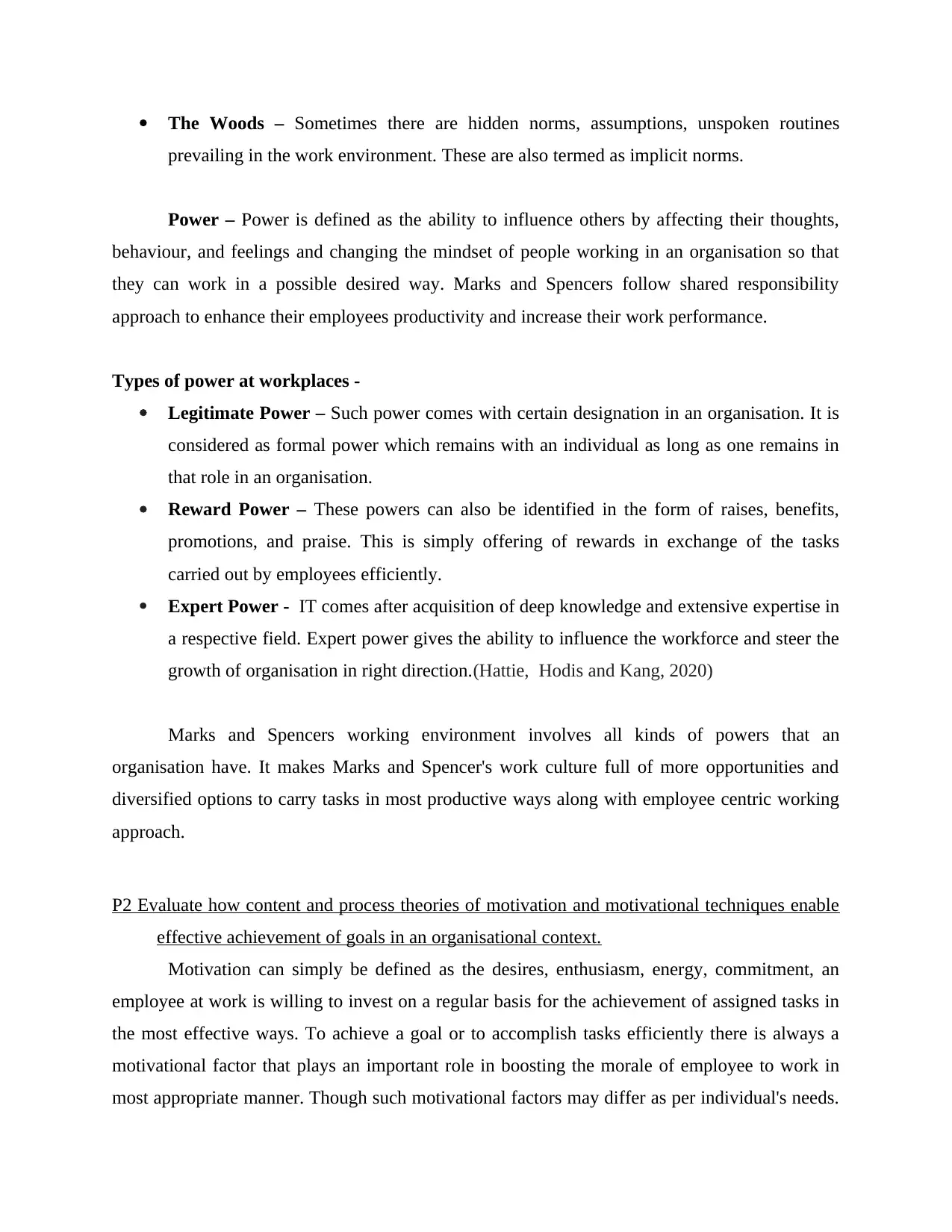
The Woods – Sometimes there are hidden norms, assumptions, unspoken routines
prevailing in the work environment. These are also termed as implicit norms.
Power – Power is defined as the ability to influence others by affecting their thoughts,
behaviour, and feelings and changing the mindset of people working in an organisation so that
they can work in a possible desired way. Marks and Spencers follow shared responsibility
approach to enhance their employees productivity and increase their work performance.
Types of power at workplaces -
Legitimate Power – Such power comes with certain designation in an organisation. It is
considered as formal power which remains with an individual as long as one remains in
that role in an organisation.
Reward Power – These powers can also be identified in the form of raises, benefits,
promotions, and praise. This is simply offering of rewards in exchange of the tasks
carried out by employees efficiently.
Expert Power - IT comes after acquisition of deep knowledge and extensive expertise in
a respective field. Expert power gives the ability to influence the workforce and steer the
growth of organisation in right direction.(Hattie, Hodis and Kang, 2020)
Marks and Spencers working environment involves all kinds of powers that an
organisation have. It makes Marks and Spencer's work culture full of more opportunities and
diversified options to carry tasks in most productive ways along with employee centric working
approach.
P2 Evaluate how content and process theories of motivation and motivational techniques enable
effective achievement of goals in an organisational context.
Motivation can simply be defined as the desires, enthusiasm, energy, commitment, an
employee at work is willing to invest on a regular basis for the achievement of assigned tasks in
the most effective ways. To achieve a goal or to accomplish tasks efficiently there is always a
motivational factor that plays an important role in boosting the morale of employee to work in
most appropriate manner. Though such motivational factors may differ as per individual's needs.
prevailing in the work environment. These are also termed as implicit norms.
Power – Power is defined as the ability to influence others by affecting their thoughts,
behaviour, and feelings and changing the mindset of people working in an organisation so that
they can work in a possible desired way. Marks and Spencers follow shared responsibility
approach to enhance their employees productivity and increase their work performance.
Types of power at workplaces -
Legitimate Power – Such power comes with certain designation in an organisation. It is
considered as formal power which remains with an individual as long as one remains in
that role in an organisation.
Reward Power – These powers can also be identified in the form of raises, benefits,
promotions, and praise. This is simply offering of rewards in exchange of the tasks
carried out by employees efficiently.
Expert Power - IT comes after acquisition of deep knowledge and extensive expertise in
a respective field. Expert power gives the ability to influence the workforce and steer the
growth of organisation in right direction.(Hattie, Hodis and Kang, 2020)
Marks and Spencers working environment involves all kinds of powers that an
organisation have. It makes Marks and Spencer's work culture full of more opportunities and
diversified options to carry tasks in most productive ways along with employee centric working
approach.
P2 Evaluate how content and process theories of motivation and motivational techniques enable
effective achievement of goals in an organisational context.
Motivation can simply be defined as the desires, enthusiasm, energy, commitment, an
employee at work is willing to invest on a regular basis for the achievement of assigned tasks in
the most effective ways. To achieve a goal or to accomplish tasks efficiently there is always a
motivational factor that plays an important role in boosting the morale of employee to work in
most appropriate manner. Though such motivational factors may differ as per individual's needs.
⊘ This is a preview!⊘
Do you want full access?
Subscribe today to unlock all pages.

Trusted by 1+ million students worldwide
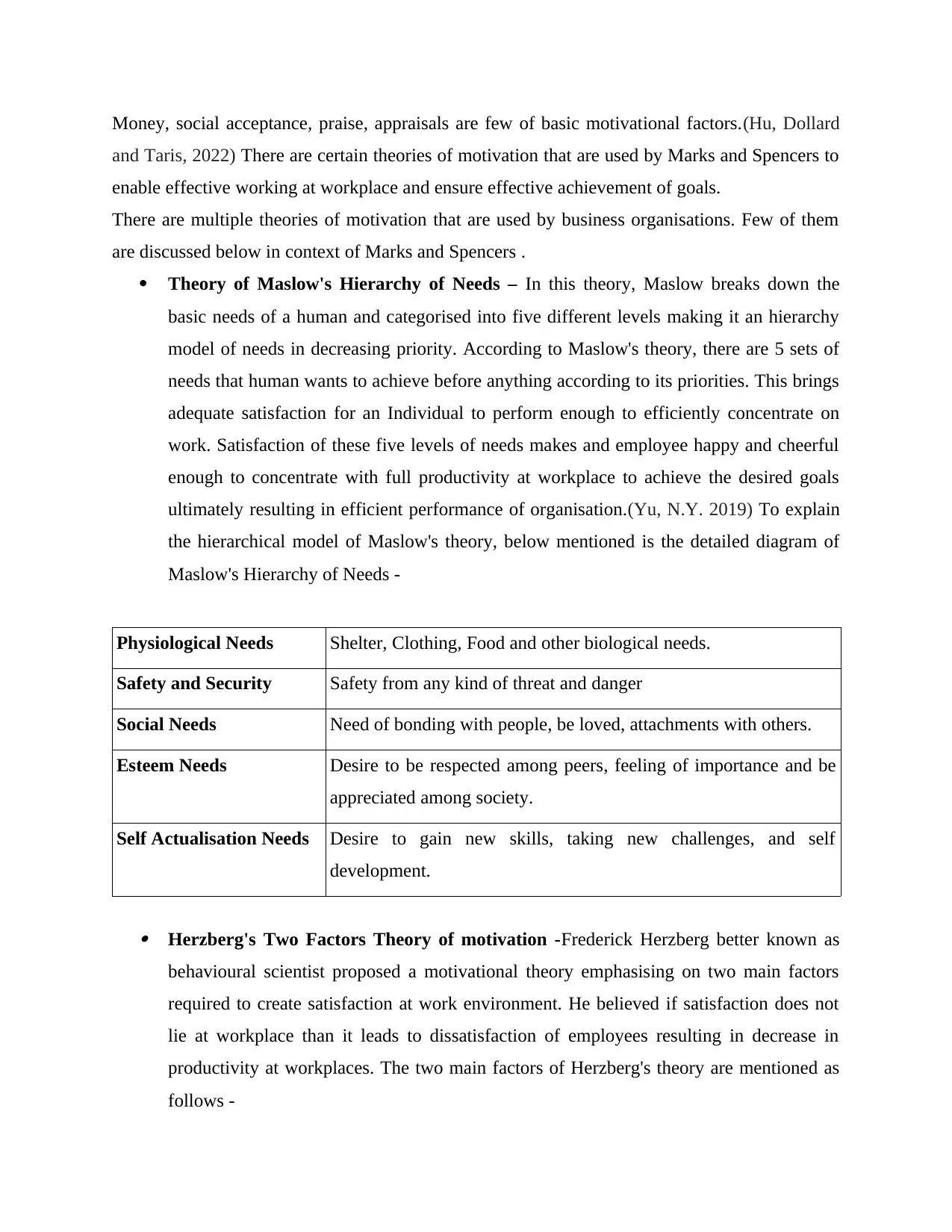
Money, social acceptance, praise, appraisals are few of basic motivational factors.(Hu, Dollard
and Taris, 2022) There are certain theories of motivation that are used by Marks and Spencers to
enable effective working at workplace and ensure effective achievement of goals.
There are multiple theories of motivation that are used by business organisations. Few of them
are discussed below in context of Marks and Spencers .
Theory of Maslow's Hierarchy of Needs – In this theory, Maslow breaks down the
basic needs of a human and categorised into five different levels making it an hierarchy
model of needs in decreasing priority. According to Maslow's theory, there are 5 sets of
needs that human wants to achieve before anything according to its priorities. This brings
adequate satisfaction for an Individual to perform enough to efficiently concentrate on
work. Satisfaction of these five levels of needs makes and employee happy and cheerful
enough to concentrate with full productivity at workplace to achieve the desired goals
ultimately resulting in efficient performance of organisation.(Yu, N.Y. 2019) To explain
the hierarchical model of Maslow's theory, below mentioned is the detailed diagram of
Maslow's Hierarchy of Needs -
Physiological Needs Shelter, Clothing, Food and other biological needs.
Safety and Security Safety from any kind of threat and danger
Social Needs Need of bonding with people, be loved, attachments with others.
Esteem Needs Desire to be respected among peers, feeling of importance and be
appreciated among society.
Self Actualisation Needs Desire to gain new skills, taking new challenges, and self
development.
Herzberg's Two Factors Theory of motivation -Frederick Herzberg better known as
behavioural scientist proposed a motivational theory emphasising on two main factors
required to create satisfaction at work environment. He believed if satisfaction does not
lie at workplace than it leads to dissatisfaction of employees resulting in decrease in
productivity at workplaces. The two main factors of Herzberg's theory are mentioned as
follows -
and Taris, 2022) There are certain theories of motivation that are used by Marks and Spencers to
enable effective working at workplace and ensure effective achievement of goals.
There are multiple theories of motivation that are used by business organisations. Few of them
are discussed below in context of Marks and Spencers .
Theory of Maslow's Hierarchy of Needs – In this theory, Maslow breaks down the
basic needs of a human and categorised into five different levels making it an hierarchy
model of needs in decreasing priority. According to Maslow's theory, there are 5 sets of
needs that human wants to achieve before anything according to its priorities. This brings
adequate satisfaction for an Individual to perform enough to efficiently concentrate on
work. Satisfaction of these five levels of needs makes and employee happy and cheerful
enough to concentrate with full productivity at workplace to achieve the desired goals
ultimately resulting in efficient performance of organisation.(Yu, N.Y. 2019) To explain
the hierarchical model of Maslow's theory, below mentioned is the detailed diagram of
Maslow's Hierarchy of Needs -
Physiological Needs Shelter, Clothing, Food and other biological needs.
Safety and Security Safety from any kind of threat and danger
Social Needs Need of bonding with people, be loved, attachments with others.
Esteem Needs Desire to be respected among peers, feeling of importance and be
appreciated among society.
Self Actualisation Needs Desire to gain new skills, taking new challenges, and self
development.
Herzberg's Two Factors Theory of motivation -Frederick Herzberg better known as
behavioural scientist proposed a motivational theory emphasising on two main factors
required to create satisfaction at work environment. He believed if satisfaction does not
lie at workplace than it leads to dissatisfaction of employees resulting in decrease in
productivity at workplaces. The two main factors of Herzberg's theory are mentioned as
follows -
Paraphrase This Document
Need a fresh take? Get an instant paraphrase of this document with our AI Paraphraser
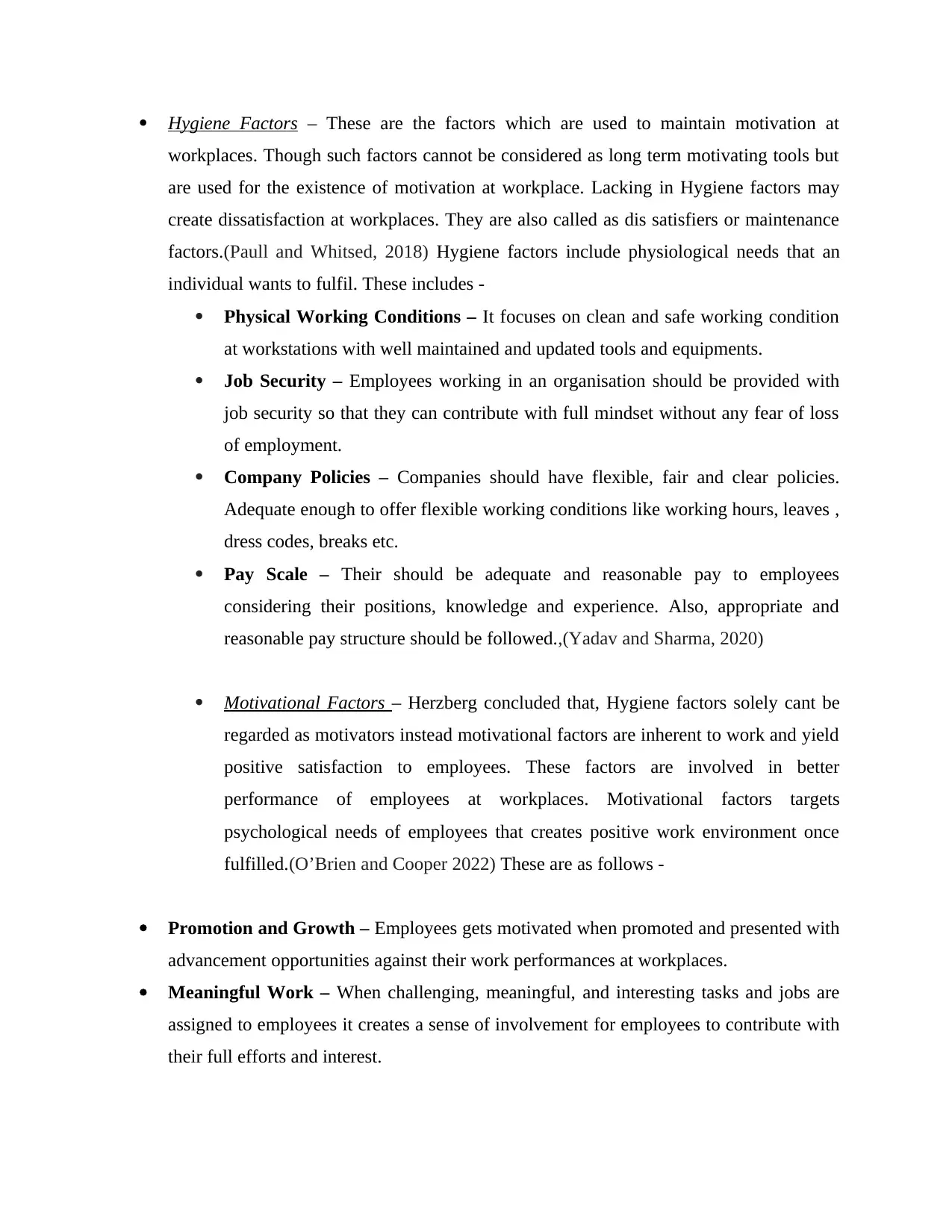
Hygiene Factors – These are the factors which are used to maintain motivation at
workplaces. Though such factors cannot be considered as long term motivating tools but
are used for the existence of motivation at workplace. Lacking in Hygiene factors may
create dissatisfaction at workplaces. They are also called as dis satisfiers or maintenance
factors.(Paull and Whitsed, 2018) Hygiene factors include physiological needs that an
individual wants to fulfil. These includes -
Physical Working Conditions – It focuses on clean and safe working condition
at workstations with well maintained and updated tools and equipments.
Job Security – Employees working in an organisation should be provided with
job security so that they can contribute with full mindset without any fear of loss
of employment.
Company Policies – Companies should have flexible, fair and clear policies.
Adequate enough to offer flexible working conditions like working hours, leaves ,
dress codes, breaks etc.
Pay Scale – Their should be adequate and reasonable pay to employees
considering their positions, knowledge and experience. Also, appropriate and
reasonable pay structure should be followed.,(Yadav and Sharma, 2020)
Motivational Factors – Herzberg concluded that, Hygiene factors solely cant be
regarded as motivators instead motivational factors are inherent to work and yield
positive satisfaction to employees. These factors are involved in better
performance of employees at workplaces. Motivational factors targets
psychological needs of employees that creates positive work environment once
fulfilled.(O’Brien and Cooper 2022) These are as follows -
Promotion and Growth – Employees gets motivated when promoted and presented with
advancement opportunities against their work performances at workplaces.
Meaningful Work – When challenging, meaningful, and interesting tasks and jobs are
assigned to employees it creates a sense of involvement for employees to contribute with
their full efforts and interest.
workplaces. Though such factors cannot be considered as long term motivating tools but
are used for the existence of motivation at workplace. Lacking in Hygiene factors may
create dissatisfaction at workplaces. They are also called as dis satisfiers or maintenance
factors.(Paull and Whitsed, 2018) Hygiene factors include physiological needs that an
individual wants to fulfil. These includes -
Physical Working Conditions – It focuses on clean and safe working condition
at workstations with well maintained and updated tools and equipments.
Job Security – Employees working in an organisation should be provided with
job security so that they can contribute with full mindset without any fear of loss
of employment.
Company Policies – Companies should have flexible, fair and clear policies.
Adequate enough to offer flexible working conditions like working hours, leaves ,
dress codes, breaks etc.
Pay Scale – Their should be adequate and reasonable pay to employees
considering their positions, knowledge and experience. Also, appropriate and
reasonable pay structure should be followed.,(Yadav and Sharma, 2020)
Motivational Factors – Herzberg concluded that, Hygiene factors solely cant be
regarded as motivators instead motivational factors are inherent to work and yield
positive satisfaction to employees. These factors are involved in better
performance of employees at workplaces. Motivational factors targets
psychological needs of employees that creates positive work environment once
fulfilled.(O’Brien and Cooper 2022) These are as follows -
Promotion and Growth – Employees gets motivated when promoted and presented with
advancement opportunities against their work performances at workplaces.
Meaningful Work – When challenging, meaningful, and interesting tasks and jobs are
assigned to employees it creates a sense of involvement for employees to contribute with
their full efforts and interest.
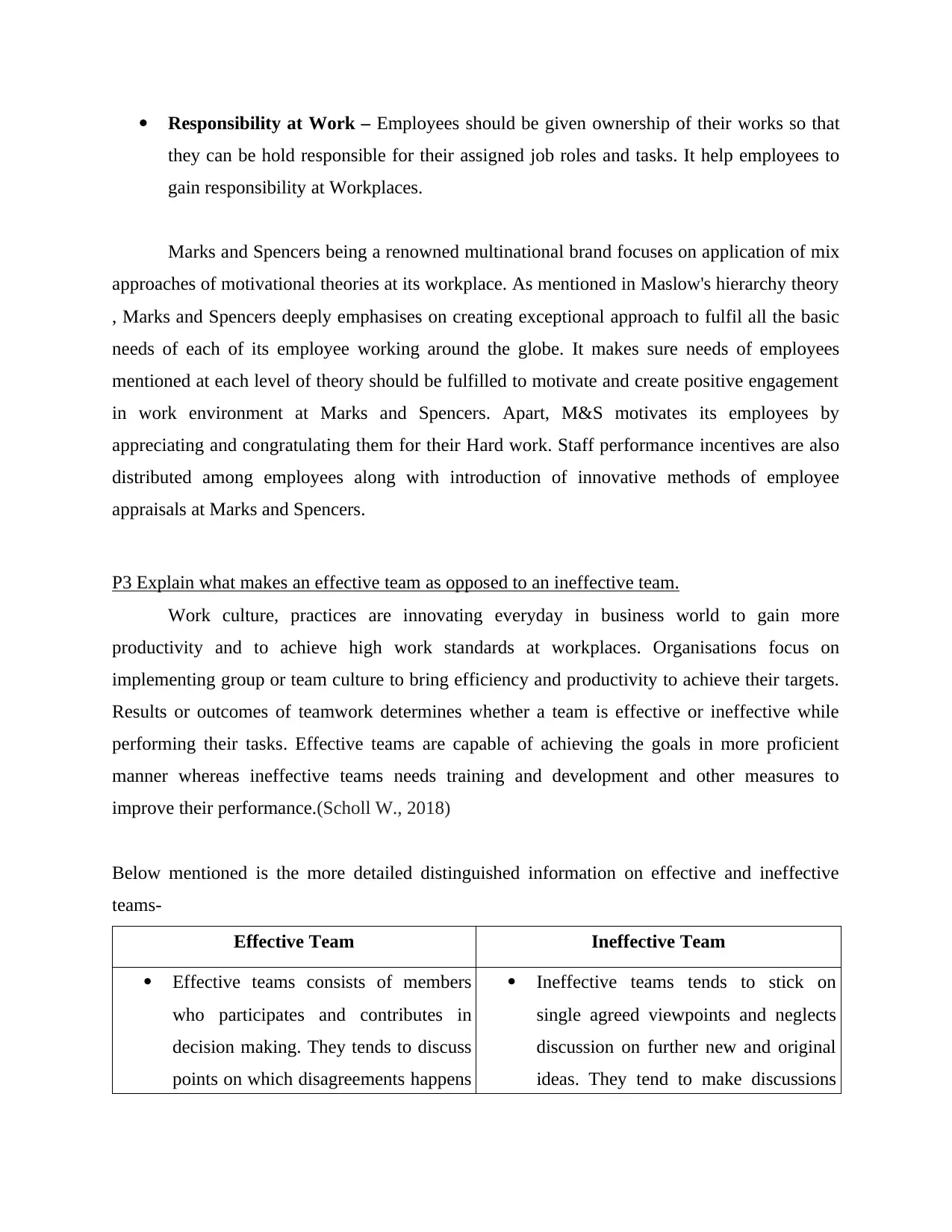
Responsibility at Work – Employees should be given ownership of their works so that
they can be hold responsible for their assigned job roles and tasks. It help employees to
gain responsibility at Workplaces.
Marks and Spencers being a renowned multinational brand focuses on application of mix
approaches of motivational theories at its workplace. As mentioned in Maslow's hierarchy theory
, Marks and Spencers deeply emphasises on creating exceptional approach to fulfil all the basic
needs of each of its employee working around the globe. It makes sure needs of employees
mentioned at each level of theory should be fulfilled to motivate and create positive engagement
in work environment at Marks and Spencers. Apart, M&S motivates its employees by
appreciating and congratulating them for their Hard work. Staff performance incentives are also
distributed among employees along with introduction of innovative methods of employee
appraisals at Marks and Spencers.
P3 Explain what makes an effective team as opposed to an ineffective team.
Work culture, practices are innovating everyday in business world to gain more
productivity and to achieve high work standards at workplaces. Organisations focus on
implementing group or team culture to bring efficiency and productivity to achieve their targets.
Results or outcomes of teamwork determines whether a team is effective or ineffective while
performing their tasks. Effective teams are capable of achieving the goals in more proficient
manner whereas ineffective teams needs training and development and other measures to
improve their performance.(Scholl W., 2018)
Below mentioned is the more detailed distinguished information on effective and ineffective
teams-
Effective Team Ineffective Team
Effective teams consists of members
who participates and contributes in
decision making. They tends to discuss
points on which disagreements happens
Ineffective teams tends to stick on
single agreed viewpoints and neglects
discussion on further new and original
ideas. They tend to make discussions
they can be hold responsible for their assigned job roles and tasks. It help employees to
gain responsibility at Workplaces.
Marks and Spencers being a renowned multinational brand focuses on application of mix
approaches of motivational theories at its workplace. As mentioned in Maslow's hierarchy theory
, Marks and Spencers deeply emphasises on creating exceptional approach to fulfil all the basic
needs of each of its employee working around the globe. It makes sure needs of employees
mentioned at each level of theory should be fulfilled to motivate and create positive engagement
in work environment at Marks and Spencers. Apart, M&S motivates its employees by
appreciating and congratulating them for their Hard work. Staff performance incentives are also
distributed among employees along with introduction of innovative methods of employee
appraisals at Marks and Spencers.
P3 Explain what makes an effective team as opposed to an ineffective team.
Work culture, practices are innovating everyday in business world to gain more
productivity and to achieve high work standards at workplaces. Organisations focus on
implementing group or team culture to bring efficiency and productivity to achieve their targets.
Results or outcomes of teamwork determines whether a team is effective or ineffective while
performing their tasks. Effective teams are capable of achieving the goals in more proficient
manner whereas ineffective teams needs training and development and other measures to
improve their performance.(Scholl W., 2018)
Below mentioned is the more detailed distinguished information on effective and ineffective
teams-
Effective Team Ineffective Team
Effective teams consists of members
who participates and contributes in
decision making. They tends to discuss
points on which disagreements happens
Ineffective teams tends to stick on
single agreed viewpoints and neglects
discussion on further new and original
ideas. They tend to make discussions
⊘ This is a preview!⊘
Do you want full access?
Subscribe today to unlock all pages.

Trusted by 1+ million students worldwide
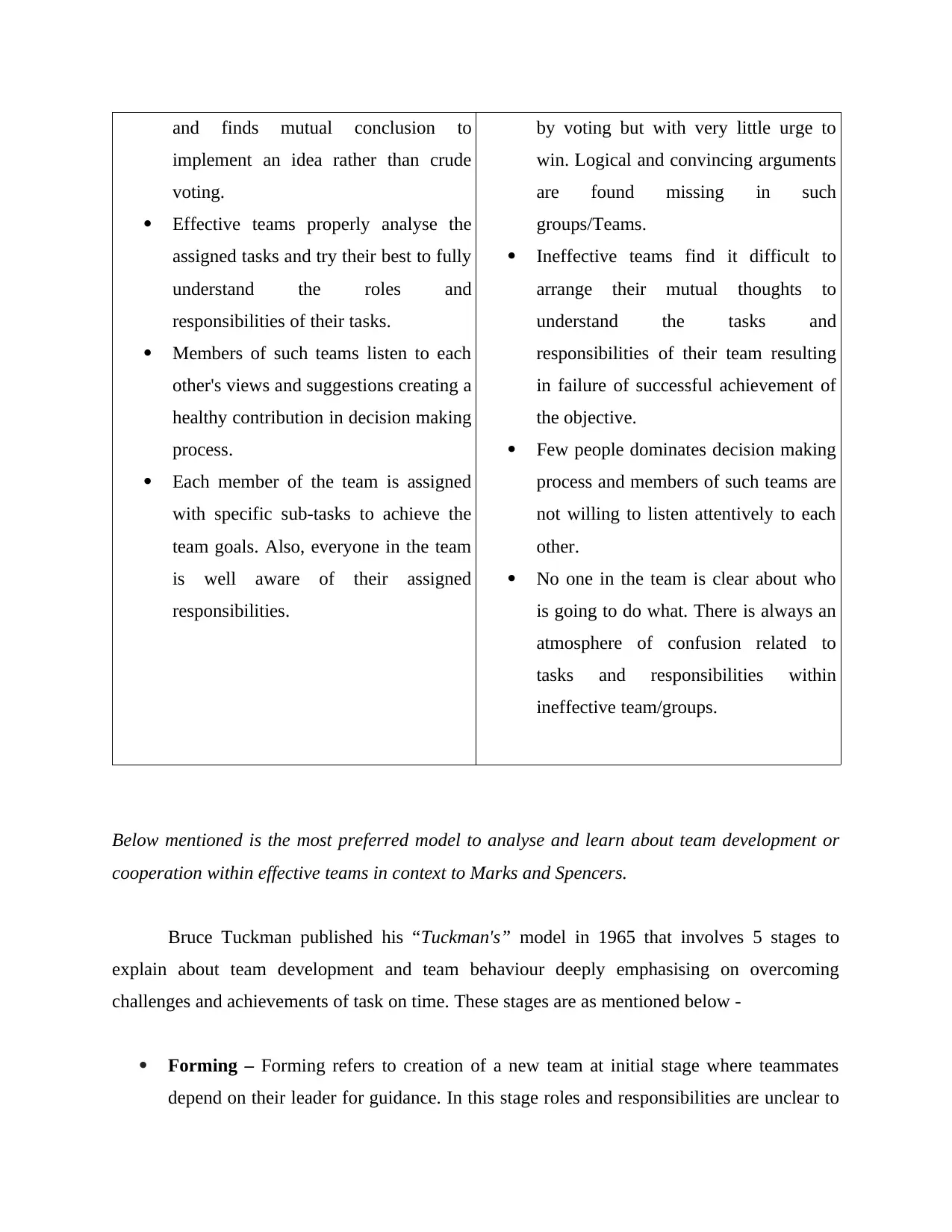
and finds mutual conclusion to
implement an idea rather than crude
voting.
Effective teams properly analyse the
assigned tasks and try their best to fully
understand the roles and
responsibilities of their tasks.
Members of such teams listen to each
other's views and suggestions creating a
healthy contribution in decision making
process.
Each member of the team is assigned
with specific sub-tasks to achieve the
team goals. Also, everyone in the team
is well aware of their assigned
responsibilities.
by voting but with very little urge to
win. Logical and convincing arguments
are found missing in such
groups/Teams.
Ineffective teams find it difficult to
arrange their mutual thoughts to
understand the tasks and
responsibilities of their team resulting
in failure of successful achievement of
the objective.
Few people dominates decision making
process and members of such teams are
not willing to listen attentively to each
other.
No one in the team is clear about who
is going to do what. There is always an
atmosphere of confusion related to
tasks and responsibilities within
ineffective team/groups.
Below mentioned is the most preferred model to analyse and learn about team development or
cooperation within effective teams in context to Marks and Spencers.
Bruce Tuckman published his “Tuckman's” model in 1965 that involves 5 stages to
explain about team development and team behaviour deeply emphasising on overcoming
challenges and achievements of task on time. These stages are as mentioned below -
Forming – Forming refers to creation of a new team at initial stage where teammates
depend on their leader for guidance. In this stage roles and responsibilities are unclear to
implement an idea rather than crude
voting.
Effective teams properly analyse the
assigned tasks and try their best to fully
understand the roles and
responsibilities of their tasks.
Members of such teams listen to each
other's views and suggestions creating a
healthy contribution in decision making
process.
Each member of the team is assigned
with specific sub-tasks to achieve the
team goals. Also, everyone in the team
is well aware of their assigned
responsibilities.
by voting but with very little urge to
win. Logical and convincing arguments
are found missing in such
groups/Teams.
Ineffective teams find it difficult to
arrange their mutual thoughts to
understand the tasks and
responsibilities of their team resulting
in failure of successful achievement of
the objective.
Few people dominates decision making
process and members of such teams are
not willing to listen attentively to each
other.
No one in the team is clear about who
is going to do what. There is always an
atmosphere of confusion related to
tasks and responsibilities within
ineffective team/groups.
Below mentioned is the most preferred model to analyse and learn about team development or
cooperation within effective teams in context to Marks and Spencers.
Bruce Tuckman published his “Tuckman's” model in 1965 that involves 5 stages to
explain about team development and team behaviour deeply emphasising on overcoming
challenges and achievements of task on time. These stages are as mentioned below -
Forming – Forming refers to creation of a new team at initial stage where teammates
depend on their leader for guidance. In this stage roles and responsibilities are unclear to
Paraphrase This Document
Need a fresh take? Get an instant paraphrase of this document with our AI Paraphraser
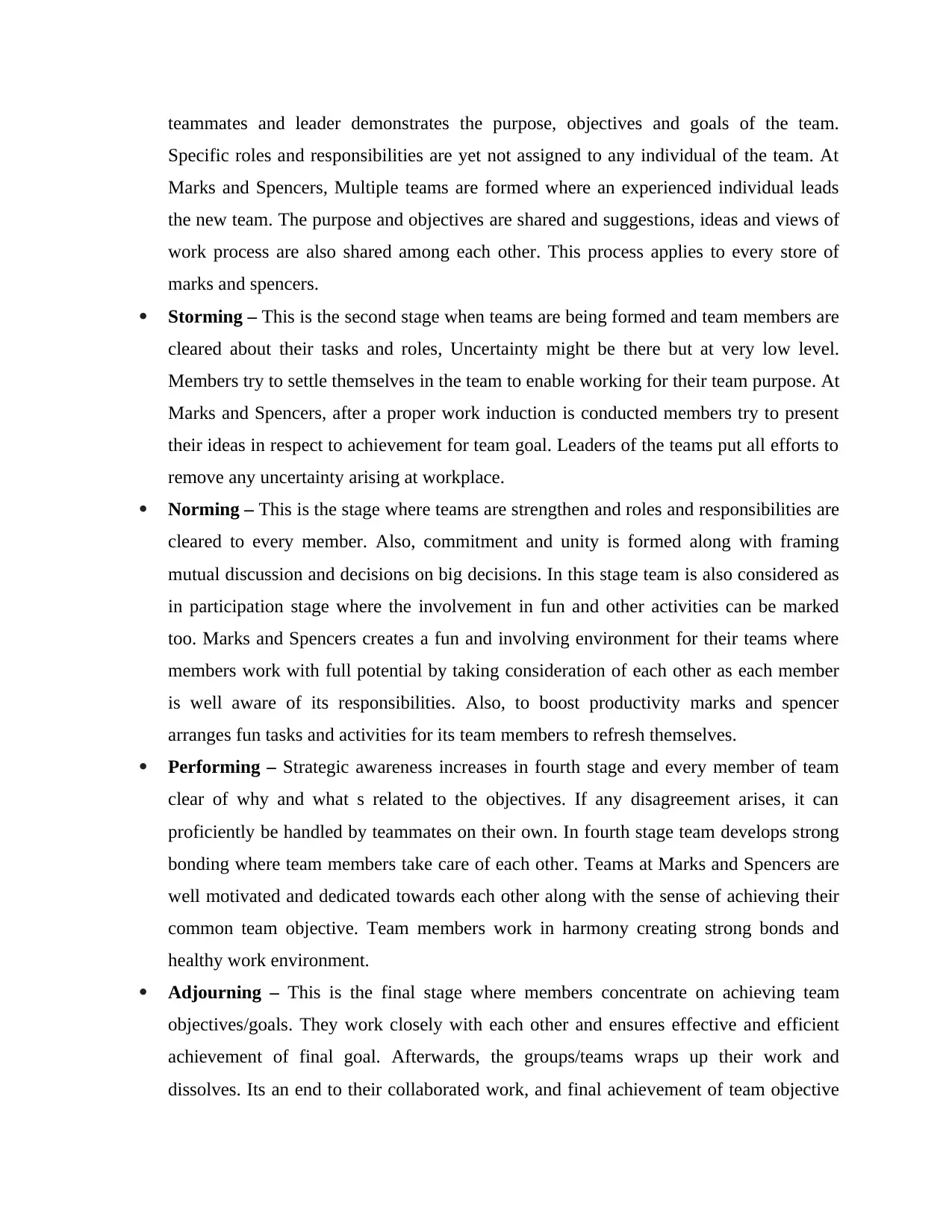
teammates and leader demonstrates the purpose, objectives and goals of the team.
Specific roles and responsibilities are yet not assigned to any individual of the team. At
Marks and Spencers, Multiple teams are formed where an experienced individual leads
the new team. The purpose and objectives are shared and suggestions, ideas and views of
work process are also shared among each other. This process applies to every store of
marks and spencers.
Storming – This is the second stage when teams are being formed and team members are
cleared about their tasks and roles, Uncertainty might be there but at very low level.
Members try to settle themselves in the team to enable working for their team purpose. At
Marks and Spencers, after a proper work induction is conducted members try to present
their ideas in respect to achievement for team goal. Leaders of the teams put all efforts to
remove any uncertainty arising at workplace.
Norming – This is the stage where teams are strengthen and roles and responsibilities are
cleared to every member. Also, commitment and unity is formed along with framing
mutual discussion and decisions on big decisions. In this stage team is also considered as
in participation stage where the involvement in fun and other activities can be marked
too. Marks and Spencers creates a fun and involving environment for their teams where
members work with full potential by taking consideration of each other as each member
is well aware of its responsibilities. Also, to boost productivity marks and spencer
arranges fun tasks and activities for its team members to refresh themselves.
Performing – Strategic awareness increases in fourth stage and every member of team
clear of why and what s related to the objectives. If any disagreement arises, it can
proficiently be handled by teammates on their own. In fourth stage team develops strong
bonding where team members take care of each other. Teams at Marks and Spencers are
well motivated and dedicated towards each other along with the sense of achieving their
common team objective. Team members work in harmony creating strong bonds and
healthy work environment.
Adjourning – This is the final stage where members concentrate on achieving team
objectives/goals. They work closely with each other and ensures effective and efficient
achievement of final goal. Afterwards, the groups/teams wraps up their work and
dissolves. Its an end to their collaborated work, and final achievement of team objective
Specific roles and responsibilities are yet not assigned to any individual of the team. At
Marks and Spencers, Multiple teams are formed where an experienced individual leads
the new team. The purpose and objectives are shared and suggestions, ideas and views of
work process are also shared among each other. This process applies to every store of
marks and spencers.
Storming – This is the second stage when teams are being formed and team members are
cleared about their tasks and roles, Uncertainty might be there but at very low level.
Members try to settle themselves in the team to enable working for their team purpose. At
Marks and Spencers, after a proper work induction is conducted members try to present
their ideas in respect to achievement for team goal. Leaders of the teams put all efforts to
remove any uncertainty arising at workplace.
Norming – This is the stage where teams are strengthen and roles and responsibilities are
cleared to every member. Also, commitment and unity is formed along with framing
mutual discussion and decisions on big decisions. In this stage team is also considered as
in participation stage where the involvement in fun and other activities can be marked
too. Marks and Spencers creates a fun and involving environment for their teams where
members work with full potential by taking consideration of each other as each member
is well aware of its responsibilities. Also, to boost productivity marks and spencer
arranges fun tasks and activities for its team members to refresh themselves.
Performing – Strategic awareness increases in fourth stage and every member of team
clear of why and what s related to the objectives. If any disagreement arises, it can
proficiently be handled by teammates on their own. In fourth stage team develops strong
bonding where team members take care of each other. Teams at Marks and Spencers are
well motivated and dedicated towards each other along with the sense of achieving their
common team objective. Team members work in harmony creating strong bonds and
healthy work environment.
Adjourning – This is the final stage where members concentrate on achieving team
objectives/goals. They work closely with each other and ensures effective and efficient
achievement of final goal. Afterwards, the groups/teams wraps up their work and
dissolves. Its an end to their collaborated work, and final achievement of team objective
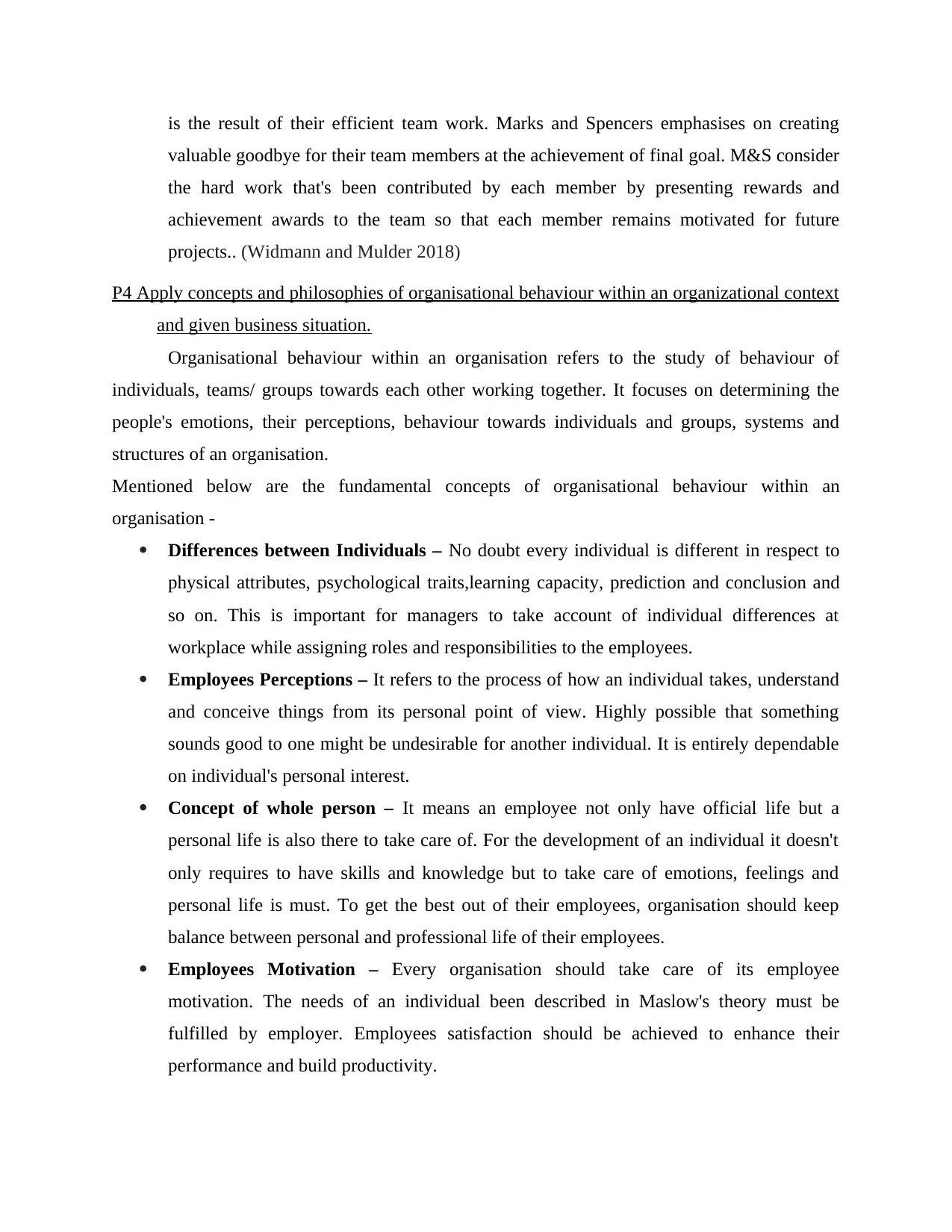
is the result of their efficient team work. Marks and Spencers emphasises on creating
valuable goodbye for their team members at the achievement of final goal. M&S consider
the hard work that's been contributed by each member by presenting rewards and
achievement awards to the team so that each member remains motivated for future
projects.. (Widmann and Mulder 2018)
P4 Apply concepts and philosophies of organisational behaviour within an organizational context
and given business situation.
Organisational behaviour within an organisation refers to the study of behaviour of
individuals, teams/ groups towards each other working together. It focuses on determining the
people's emotions, their perceptions, behaviour towards individuals and groups, systems and
structures of an organisation.
Mentioned below are the fundamental concepts of organisational behaviour within an
organisation -
Differences between Individuals – No doubt every individual is different in respect to
physical attributes, psychological traits,learning capacity, prediction and conclusion and
so on. This is important for managers to take account of individual differences at
workplace while assigning roles and responsibilities to the employees.
Employees Perceptions – It refers to the process of how an individual takes, understand
and conceive things from its personal point of view. Highly possible that something
sounds good to one might be undesirable for another individual. It is entirely dependable
on individual's personal interest.
Concept of whole person – It means an employee not only have official life but a
personal life is also there to take care of. For the development of an individual it doesn't
only requires to have skills and knowledge but to take care of emotions, feelings and
personal life is must. To get the best out of their employees, organisation should keep
balance between personal and professional life of their employees.
Employees Motivation – Every organisation should take care of its employee
motivation. The needs of an individual been described in Maslow's theory must be
fulfilled by employer. Employees satisfaction should be achieved to enhance their
performance and build productivity.
valuable goodbye for their team members at the achievement of final goal. M&S consider
the hard work that's been contributed by each member by presenting rewards and
achievement awards to the team so that each member remains motivated for future
projects.. (Widmann and Mulder 2018)
P4 Apply concepts and philosophies of organisational behaviour within an organizational context
and given business situation.
Organisational behaviour within an organisation refers to the study of behaviour of
individuals, teams/ groups towards each other working together. It focuses on determining the
people's emotions, their perceptions, behaviour towards individuals and groups, systems and
structures of an organisation.
Mentioned below are the fundamental concepts of organisational behaviour within an
organisation -
Differences between Individuals – No doubt every individual is different in respect to
physical attributes, psychological traits,learning capacity, prediction and conclusion and
so on. This is important for managers to take account of individual differences at
workplace while assigning roles and responsibilities to the employees.
Employees Perceptions – It refers to the process of how an individual takes, understand
and conceive things from its personal point of view. Highly possible that something
sounds good to one might be undesirable for another individual. It is entirely dependable
on individual's personal interest.
Concept of whole person – It means an employee not only have official life but a
personal life is also there to take care of. For the development of an individual it doesn't
only requires to have skills and knowledge but to take care of emotions, feelings and
personal life is must. To get the best out of their employees, organisation should keep
balance between personal and professional life of their employees.
Employees Motivation – Every organisation should take care of its employee
motivation. The needs of an individual been described in Maslow's theory must be
fulfilled by employer. Employees satisfaction should be achieved to enhance their
performance and build productivity.
⊘ This is a preview!⊘
Do you want full access?
Subscribe today to unlock all pages.

Trusted by 1+ million students worldwide
1 out of 15
Related Documents
Your All-in-One AI-Powered Toolkit for Academic Success.
+13062052269
info@desklib.com
Available 24*7 on WhatsApp / Email
![[object Object]](/_next/static/media/star-bottom.7253800d.svg)
Unlock your academic potential
Copyright © 2020–2026 A2Z Services. All Rights Reserved. Developed and managed by ZUCOL.





